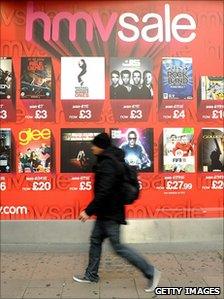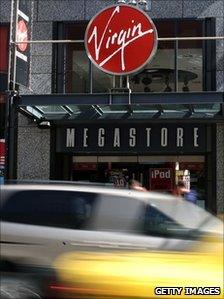Can HMV learn from global trends?
- Published

HMV is trying to make up for disappointing Christmas sales
The continuing woes of HMV underline one brutal fact of High Street life: the days of a nationwide store chain devoted entirely to selling music are gone forever.
Recession, technological change and wider social trends have all played their part.
But the effect has been irreversible. The record shop as a mass-market phenomenon now belongs to a bygone age.
To its credit, HMV has been trying to move away from that business model for some while.
Back in March 2007, it embarked on a "transformation plan" that saw it cut back on CD displays in favour of DVDs, Blu-Ray discs, MP3 players, electronic games and gadgets.
The group diversified further into areas such as concert venues, while the demise of rivals Zavvi and Woolworths left it as the last chain standing.
Yet as it has branched out, it has managed to blur its identity, making it hard to know what HMV is for.
If you go in to buy a CD, you will be frustrated at the reduction in choice. But the other products it sells can be obtained just as easily from a range of other stores.
So how can HMV evolve without losing its distinctiveness? With the same retailing trends at work around the world, it may be time to look at how music chains have fared elsewhere.
FRANCE: VIVE LA CULTURE
Despite the decline of CDs and the rise of downloads, France has managed to retain two nationwide music chains, Fnac and Virgin.
Both have a smaller number of outlets than HMV: 80 for Fnac and 37 for Virgin, as opposed to HMV's 285 stores in the UK and Irish Republic, of which about 40 now face closure (with 20 Waterstone's outlets also set to shut).
Fnac, the older of the two, was founded in 1954 as a members-only discount club before becoming a normal store in 1966.
Fnac treats CDs as "cultural products", which it sells alongside books.

The Fnac website sells digital books and music
In the early 1990s, both HMV and Virgin tried to enter the French market, but Fnac fought back so fiercely that HMV retreated after just six months, while Virgin survived only by adopting Fnac's "cultural" approach and has since changed hands twice.
HMV, of course, also sells books, but mainly through its separate Waterstone's chain.
However, integrating books and CDs has allowed Fnac to offer a more comprehensive digital strategy.
With its own newly-launched e-book reader, fnacbook, the French retailer is able to offer e-books and MP3 downloads from the same website, while HMV has struggled in the online marketplace.
And the Fnac model has proved eminently exportable. The firm now operates in eight countries outside France - Belgium, Brazil, Greece, Italy, Portugal, Spain, Switzerland and Taiwan.
GERMANY: VORSPRUNG DURCH TECHNIK
The German recorded music market is dominated by two big chains that essentially treat CDs as a technological product.
You won't see any books in branches of Saturn and Media Markt, which are vast electrical superstores selling anything from electric toothbrushes and coffee-makers to washing machines and computers.
However, they do devote large areas of floor-space to CDs. That even includes CD singles, which still sell well to German teenagers, whereas the market for them in the UK has almost completely collapsed.

Media Markt is Europe's largest retailer for consumer electronics
As in France, both retailers operate fewer stores in their homeland than HMV does in the British Isles. Media Markt has a network of 188 outlets, while Saturn has 145.
The two chains started out as competitors, but are now both owned by retail giant Metro.
Their model has been successfully exported to other countries. Between them, the two chains have a presence in 15 other countries.
In November, Media Markt added China to the list by opening its first store in Shanghai. However, one month later, Saturn decided to pull out of France by selling its 34 stores there to the HTM Group.
As in France, HMV had a short-lived presence in Germany. It entered the market there in 1996, but left again in 2003, complaining that the price-conscious German retail environment was cramping its profit margins.
US: NOWHERE TO RUN
Technology has advanced so far in the US that Apple's iTunes online store is now the biggest music retailer in the country. Until 2008, that slot was occupied by Wal-Mart, which now fights Amazon for second place.

Virgin was the last US music chainstore to close down
But as far as specialist music stores are concerned, there is not one national chain of bricks-and-mortar record shops left. Virgin was the last to fold in 2009, when it finally closed its flagship Times Square outlet in New York after running down the rest of its operations.
HMV - you may be discerning a pattern here - used to have a presence in the US market, but withdrew in 2004. However, it remains strong in Canada.
If you scour Main Street and the malls, you will find examples of both the "cultural product" and the "technological product" model of business. Bookshops such as Barnes & Noble and Borders sell CDs as well, while electrical store Best Buy offers them alongside its range of appliances and gadgets.
But efforts to export those models have met with mixed success. The British version of Borders closed down just before Christmas 2009, while Best Buy's international drive has taken it to just three countries outside North America - the UK, Turkey and China.
A swift glance at Best Buy's newest UK store, in the south London suburb of Croydon, suggests that the retailer is in no hurry to take on HMV in the music stakes. In among the shelves groaning with microwave ovens and netbook computers are just two racks of CDs, comparable to the range in the average supermarket.
THE VIRTUAL FUTURE
Compared with its counterparts in France and Germany, HMV clearly has too many stores.
And since iTunes and Amazon are not yet as all-powerful in the UK as they are across the Atlantic, HMV still has a reasonable chance as an online brand, whatever happens in the High Street.
After all, even its failed bricks-and-mortar rivals, Zavvi and Woolworths, maintain a presence in the digital domain.
HMV has certainly worked on its internet strategy, buying 50% of online music store 7digital in September 2009.
It has followed in the footsteps of rivals such as Amazon and Tesco in setting up a Channel Islands-based operation, so that its website can offer CDs VAT-free to UK customers.
The existence of this legal loophole has angered small retailers, who have set up their own pressure group - Retailers Against VAT Abuse Schemes - in order to campaign against it.
But while HMV is fighting for its survival, it is doubtless prepared to use every opportunity to gain an advantage.